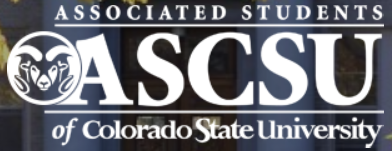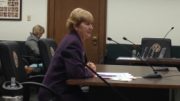By Jeffrey A. Roberts
CFOIC Executive Director
The Rocky Mountain Collegian, the student newspaper at Colorado State University in Fort Collins, cried foul one evening last week when a reporter was kept out of a hearing at which the student government impeached an elected senator.
The vice president of the Associated Students of Colorado State University (ASCSU) claimed that Colorado’s Open Meetings Law, also known as the Sunshine Law, doesn’t apply to the university’s student government. Mike Hooker, executive director of public affairs and communications for CSU, agreed, saying that ASCSU “is not a state or a local public body.”
But plenty of evidence suggests that CSU’s student government should indeed be subject to the Sunshine Law and, therefore, the Collegian’s reporter should not have been barred from the hearing.
 The Open Meetings Law, first enacted by Colorado voters in 1972, defines a state public body (covered by the law) as “any board, committee, commission, or other advisory, policy-making, rule-making, decision-making, or formally constituted body of any state agency or authority,” including the governing body of a state institution of higher education. It covers any public or private entity given “a governmental decision-making function” by the state.
The Open Meetings Law, first enacted by Colorado voters in 1972, defines a state public body (covered by the law) as “any board, committee, commission, or other advisory, policy-making, rule-making, decision-making, or formally constituted body of any state agency or authority,” including the governing body of a state institution of higher education. It covers any public or private entity given “a governmental decision-making function” by the state.
The test for an entity at a public university is spelled out in a 2003 Denver District Court ruling that Metro State’s judicial board, which holds student disciplinary hearings, is not covered by the OML.
First, is CSU’s student government a formally constituted body of a state institution of higher education? Yes, according to Policy 400 of the CSU Board of Governors. It includes this passage: “The board authorizes the organization and operation of campus student governments in accordance with the following policies and procedures.”
Second, does the student government advise the Board of Governors or make decisions on its behalf? Well, ASCSU controls the allocation of more than $2 million of student funds. It also confirms the appointment of members to the Student Fee Review Board, which oversees the allocation of more than $54 million in student fees.
The student government’s role in the enactment of student fees is a matter of state law. HB 1301, passed by the Colorado Legislature in 2011, requires the university’s governing board to collaborate with the student government in developing a fee plan. It did just that earlier this year, according to a CSU news release on the board’s approval of tuition and fees for the new fiscal year.
“These fees are approved by the student governments of each campus to help fund a range of specific services…,” the news release says.
Adam Goldstein, attorney advocate for the Student Press Law Center, told the Collegian that ASCSU is “pretty clearly a body that has been delegated a governmental decision-making authority by a state public body. If they’d like to explain how they can divvy up $2 million worth of public money and not be a governmental body, then I would like to hear it.”
The CFOIC asked Hooker, the CSU spokesman, for a more-detailed explanation of why ASCSU would not be considered a state public body, given its responsibilities, but the university is saying nothing more. “In speaking with our (general counsel), the university’s position on this is that ASCSU is not a state body or a local public body, as those terms are defined in the Colorado Open Meetings Law. Beyond that we don’t have anything to add,” Hooker responded in an email.
If ASCSU is covered by the Sunshine Law, the closed-door impeachment of Sen. Kwon Yearby would be a violation. The impeachment of an elected legislator would not be considered a “personnel matter” that can, under the statute, be discussed in an executive session. The personnel exemption specifically does not apply to discussions concerning members or elected officials of a state public body.
It also is likely that ASCSU violated a Sunshine Law provision that prohibits decision making by secret ballot. According to a column in the Collegian this week, the names of the senators voting for and against impeachment were not released.
The CSU controversy made us wonder how the student government at the University of Colorado’s Boulder campus is viewed. In an email to the CFOIC, CU spokesman Ryan Huff said “it’s not clear” whether CU Student Government is specifically covered by the Open Meetings Law. But he pointed out that CUSG’s constitution says that “joint board meetings, policies, and budget recommendations shall be open and non-secret.”
“We take seriously that it’s public money (being allocated), and as the student government we feel we need to be as open as we can be,” said Megen Princehouse, CUSG’s office manager.
Follow the Colorado Freedom of Information Coalition on Twitter @CoFOIC. Like CFOIC’s Facebook page. Do you appreciate the information and resources provided by CFOIC? Please consider making a tax-deductible donation.




